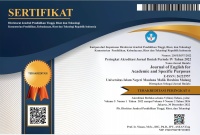THE USE OF ROLE PLAY TECHNIQUE TO IMPROVE STUDENTS’ ENGLISH ORAL COMMUNICATION
Abstract
Full Text:
PDFReferences
Akter, D. (2017). Role Play in the English Language Classroom at the Tertiary Level in Bangladesh. International Journal of English Language Teaching, 5(9), 91-99.
Arham R., Yassi, A.H., & Arafah, B. (2016). The Use of Role Play to Improve Teaching Speaking. International Journal of Scientific and Research Publications, 6(3).
Brown, H.D. (2007). Teaching by Principles: An Interactive Approach to Language Pedagogy (3rd ed.). White Plains, NY: Pearson Education, Inc.
Creswell, J.W. (2012). Educational Research: Planning, Conducting, and Evaluating, Quantitative and Qualitative Research (4th ed.). Boston: Pearson Education, Inc.
Englander, K. (2002). Real Life Problem Solving: A Collaborative Learning Activity. Forum, 40(1), 8-11.
Harmer, J. (2003). The Practice of English Language Teaching (3rd ed.). London, UK: Pearson Education.
Hyland, K. (1993). Language-learning Simulations: A Practical Guide. English Teaching Forum, 31(4), 16-22.
Jenkins, P., & Gibson, T.T. (1999). An Exercise in Critical Thinking Using Role Playing. Nurse Educator, 24(6), 11-14.
Kemmis, S., & McTaggart, R. (1988). The Action Research Planner. Geelong, Victoria, Australia: Deakin University Press.
Kim, J.O. (2018). Ongoing Speaking Anxiety of Korean EFL Learners: Case study of a TOEIC Intensive Program. The Journal of Asia TEFL, 15(1), 17-31.
Krebt, D. M. (2017). The Effectiveness of Role Play Techniques in Teaching Speaking for EFL College Students. Journal of Language Teaching and Research, 8(5), 863-870. http://dx.doi.org/10.17507/jltr.0805.04
Ladousse, G.P. (1987). Role play. Oxford: Oxford University Press.
Larsen- Freeman, D. (1986). Techniques & Principles in Language Teaching. Oxford: Oxford University Press.
Latief, M.A. (2013). Research Methods on Language Learning an Introduction, 2nd Edition. Malang: UM Press
Littlewood, W. (1981). Communicative Language Teaching. Cambridge: CUP
Nunan, D. (2001). Principles of Communicative Language Teaching. Cambridge: Cambridge University Press.
Qing, X. (2011). Role-play an Effective Approach to Developing Overall Communicative Competence. Cross-Cultural Communication, 7(4), 36-39.
Tipmontree, S., & Tasanameelarp, A. (2018). The Effects of Role-Playing Simulation Activities on the Improvement of EFL Students’ Business English Oral Communication. The Journal of Asia TEFL, 15 (3), 735-749. http://dx.doi.org/10.18823/asiatefl.2018.15.3.11.735
Tompkins, P.K. (2001). The Role-Playing Simulation. TESL, 4(8).
DOI: https://doi.org/10.18860/jeasp.v2i1.7259
Refbacks
- There are currently no refbacks.





Editorial Office:
Pusat Pengembangan Bahasa
Program Khusus Pengembangan Bahasa Inggris (PKPBI)
Universitas Islam Negeri Maulana Malik Ibrahim Malang
Gedung C lantai 1
Jl. Gajayana No 50 Kota Malang, Jawa Timur, Indonesia
Kode Pos 65144, Telp/Fax : (0341) 570872
Email: jeasp@uin-malang.ac.id







